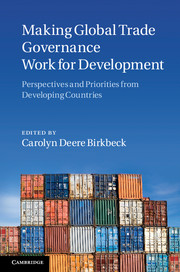 Making Global Trade Governance Work for Development
Making Global Trade Governance Work for Development Book contents
- Frontmatter
- Contents
- Figures
- Tables and boxes
- Contributors
- Acknowledgements
- Introduction
- Part I Global trade governance
- Part II Roles and responsibilities in global trade governance: diversity in developing country priorities and strategies
- Part III Strengthening multilateralism
- Part IV Making WTO negotiations and decision-making processes fairer
- Part V Conclusion
- 21 Development-oriented perspectives on global trade governance
- Index
- References
21 - Development-oriented perspectives on global trade governance
a summary of proposals for making global trade governance work for development
from Part V - Conclusion
Published online by Cambridge University Press: 07 September 2011
- Frontmatter
- Contents
- Figures
- Tables and boxes
- Contributors
- Acknowledgements
- Introduction
- Part I Global trade governance
- Part II Roles and responsibilities in global trade governance: diversity in developing country priorities and strategies
- Part III Strengthening multilateralism
- Part IV Making WTO negotiations and decision-making processes fairer
- Part V Conclusion
- 21 Development-oriented perspectives on global trade governance
- Index
- References
Summary
Demand for global trade governance that supports development is high. Developing countries have long called for a greater role in governing the global economy and its trading system. As the importance of developing countries in global trade rises and South–South trade among them grows (UNCTAD 2010), they have stepped up calls for a stronger say in the decision-making processes and institutions that impact how global trade is conducted and the way its rules are made, implemented and enforced.
This book shows that the way global trade is governed can facilitate or hinder the prospects for reaching rules and arrangements that benefit developing countries. Yet, to date, the visibility of development perspectives in the scholarly debates on global trade governance has been weak. The unique contribution of this volume is its compilation of a broad geographical spectrum of development-oriented views and proposals, and its engagement of scholars and practitioners from government, international organizations and stakeholder groups. The volume builds on a large body of literature and many years of policy discussion on global trade governance, the future of the global trading system and how to make trade fairer for developing countries.
- Type
- Chapter
- Information
- Making Global Trade Governance Work for DevelopmentPerspectives and Priorities from Developing Countries, pp. 579 - 667Publisher: Cambridge University PressPrint publication year: 2011
